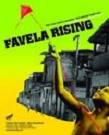|
|
||||
|
|
by Donald Levit  No matter how humongous the home screen, viewing a film on DVD or HBO/Cinemax does not equal the movie-house experience. So perhaps multiple prize-winning (including at Tribeca) Favela Rising will play better on theatrical release, when high-contrast color bleeding, frenetic editing, and badly cropped close-ups may not be so distracting. Brought to outside consciousness and conscience by City of Over two years, Matt Mochary and Jeff Zimbalist, who shared directing, producing and cinematography duties, made frequent trips down to film and live in the area and also teach DV technique to young people whose input and “self-representation” was included within the documentary. Movement is the operative term for both the resultant form and for the thread that would tie it all together, the Grupo Cultural AfroReggae initiated and led by bespectacled ex-trafficker Anderson Sá and local activist José Junior. The rare feel-good story of growth and success in offering opportunity and an alternative to serving drug lords (and attracting female “Maria Gasolinas”) -- one of whom personally appeared to give thanks for saving his younger brother -- is interview-narrated by several, but overwhelmingly so by Apart from final minutes that seem nearly unbelievable as a sworn medical “miracle” and too perfect symbolic summation, the documentary follows the grass-roots organization right from its 1993 baby-steps cultural publication ArfoReggae News, aimed at young residents attracted to national music genres as influenced by Jamaican reggae and North American soul and hip-hop. Looking to provide cultural and artistic options to combat criminality, the GCAR simultaneously oversaw new community and legal services centers and fostered workshops in dance and dance-oriented martial arts copoeira, in theater and acrobatic circus, percussion, baby and AIDS and general health care, environmentalism, audiovisuals (including film) and sports. Hodgepodge cuts, with difficult to read subtitles, convey an appropriately heady sense of the admirable advances in promoting pride and participation in rich Afro-Brazilian culture. But too much is presented or told by heads, so that random disconnected seconds of adolescents jamming or banging drums come across in music clip style, too pounding for the many and unsatisfyingly truncated for others who are fans. The founders and leaders expand outreach activities (including to Success here is sweet and inspirational. Crossing fingers for a continuation of similar bootstrap efforts, however, the moviegoer longs for a dramatized, less narrated, bumpy and pep-talky picture of the process. (Released by ThinkFilm; not rated by MPAA.) |
||
|
© 2024 - ReelTalk Movie Reviews Website designed by Dot Pitch Studios, LLC |



